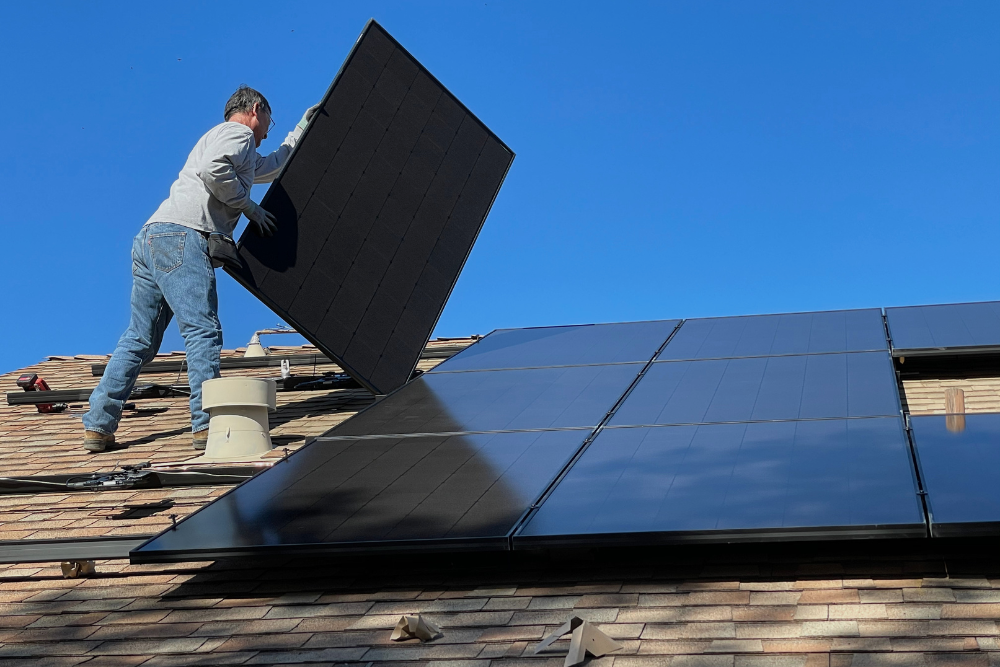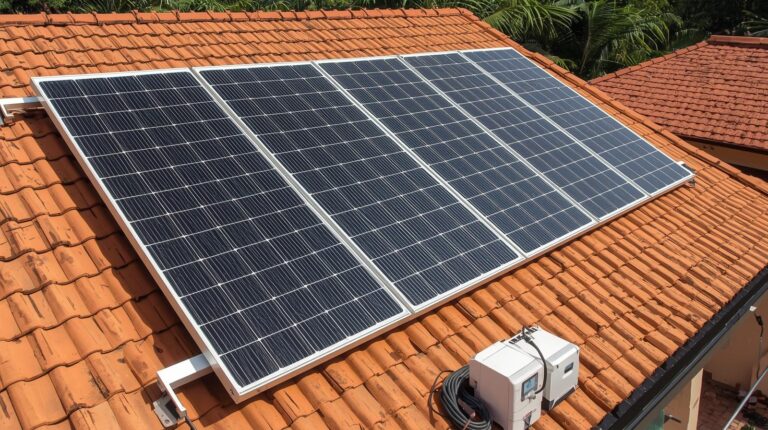Having solar panels installed on your home can save you money in the long run. But what are the costs involved? And can you get rebates? In this short article we’ll be discussing a little bit more about the real cost of installing solar panels on your home so you have a clearer image about this interesting topic.
How Much Do Solar Panels Cost?
Having solar panels on your home can greatly reduce your monthly electricity bill. However, the costs associated with installing panels vary by location. The amount of sunlight available to your home, the size of your home, and your energy usage all affect the final cost of your solar panel system.
The most cost-effective way to purchase solar panels is to pay for them up front. The average 5-kW system costs between $3 and $5 per watt. You can find out how much your system will cost by using a free solar calculator.
If you have a smaller budget, you can opt for thin-film solar panels. These are made by layering a photovoltaic material on a glass surface. However, thin-film panels take up a lot of space and are not very efficient.
For the most energy-efficient systems, you should opt for monocrystalline solar panels. Monocrystalline panels are made from pure silicon sheets and offer the best efficiency.
If you live in a state with ample year-round sunlight, you will be able to produce more electricity with a smaller system. In addition, you may be eligible for tax credits.
Are Rebates Available for Installing Solar Panels?
Whether you are looking to save money on your power bill or want to increase the value of your home, installing solar panels can be a good investment. Many states and municipalities offer solar rebate programs. These rebates can save homeowners between 10 and 20 percent of the total cost of the solar system.
Depending on the state, solar panel rebates may be available through a utility or through the state or local government. These rebates are paid upfront and are usually limited in time.
Solar rebates vary widely, but they are typically paid in the form of a one-time payment. Some rebates are offered by the utility company and others are offered by the manufacturer of the solar panel system.
You should contact your utility company or state government to learn more about solar rebate programs. Some companies may offer up-front rebates, while others offer rebates on a price-per-watt basis.
Some states offer subsidized loans to purchase solar panels. There are also some non-government organizations that offer subsidized loans for solar panels.
Some utilities offer net metering programs, which allows the solar energy produced by a system to be sold back to the grid. These programs vary from state to state, but they often offer discounts for battery backup.
Read: Home Energy Efficiency Improvement Tax Credits.
How Much Will Solar Panels Really Save Me?
Having solar panels installed on your home is a great way to cut back on your monthly electric bill. However, the amount you’ll save depends on the size of your home and your local energy costs. You can save up to 40% on your monthly bill by installing solar panels.
One of the easiest ways to estimate the amount you’ll save is to calculate how many kilowatt hours (kWh) you’re likely to use in a month. You can get this information from your utility bill. The number of kWh used in a month can be divided by 30 to get a daily kWh usage.
Purchasing a solar panel system is an expensive proposition, but there are many ways to save on your energy bill. Some states have programs that allow homeowners to sell excess power to the grid. You can also take advantage of federal depreciation benefits. You can also save up to $5,000 by shopping around.
The cheapest way to get a solar panel system installed is to hire a solar installer. This reduces your overall equipment costs and allows you to get the most out of your solar investment. But if you are interested in learning how to install solar panels by yourself I highly recommend you check out DIY Home Energy System by Jeff Davis. This man is a real pro on this topic and the guide is superb.
Are Cheap Solar Panels Worth It?
Purchasing a solar panel is a big investment. However, you can save thousands on your electric bill by installing solar panels on your home. You’ll need a professional to install your system. The cost will depend on many factors, such as where you live.
Solar panels are available in many types, with different levels of power output, durability, and reliability. You’ll want to research and compare the different types before purchasing.
You’ll also want to check for hidden defects that may cause a lower power output. Also, consider the cost of a warranty. Cheap panels may have a shorter warranty than more expensive options.
Monocrystalline solar panels are the most common type. These panels are characterized by a sleek black finish and are the most efficient. Polycrystalline panels are cheaper but are less efficient.
Polycrystalline solar panels are composed of several silicone fragments melded together. These cells are more prone to delamination, which causes the glass and plastic to separate. This leads to corrosion and system failure.
Monocrystalline panels are usually more expensive than polycrystalline panels. However, you’ll pay more for the quality of the panel.
Can I Earn Money from Solar Panels?
Investing in solar panels can save you a lot of money on your electric bill. The amount of money you save will vary depending on the state you live in. The savings will also vary depending on the size of your solar panel system.
The question then is, can I actually earn money from my solar panel? The answer depends on how many panels you have and how much electricity you use.
To see how much money you can save, log into your electric company account, and see how much electricity you have used in the past. Calculate the average of the last several months. You may also want to account for seasonal temperature changes and other fluctuations in cost.
You can also earn money by selling your excess electricity to the power company. Depending on how much energy you have produced, you may be able to receive a rebate or cash refund.
The amount of money you can save from solar panels will depend on your state, the size of your system, and how much you use. Considering that the average American family spends $1430 on electricity, a solar panel system can save you a substantial amount of money each year.
Are Solar Panels Worth It?
Using solar panels to offset your monthly electric bill can be a smart idea. However, before you make the leap, you should first learn about all the options. Choosing the right solar panel can save you money and increase the value of your home.
Solar power has come a long way in recent years. Today, you can purchase a solar system for less than one-third the price it cost ten years ago. However, you should know that the cost of solar energy is dependent on many factors, including your location and energy usage. You should also take into consideration other factors, such as seasonal temperature changes, to get the most out of your solar investment.
One of the biggest reasons people choose to install their own solar system is to reduce their overall energy bill. Some states offer incentives that help homeowners reduce their electric bill, while others allow homeowners to sell their excess power back to the utility. If you are considering a solar panel system, it is a good idea to check with your local energy supplier to find out about any incentives available to you.
Is a DIY Solar Panel Worth It?
Whether you are an amateur or an expert, the decision to install a solar panel at home can be a difficult one. There are some good reasons to go DIY, but there are also some disadvantages. You should weigh the cost and time savings of doing it yourself against the time you spend.
Installing a solar panel system is a significant investment. The process involves planning, organization, and technical expertise. You should consult your local zoning ordinances to determine if it is legal to install solar on your property. You will also need to obtain a permit and interconnection approval from your utility company.
Installing a solar panel system requires you to learn about electrical systems and the different types of solar panels. You should also research inverters and batteries. There are also a number of tax incentives available.
You should also evaluate the quality and cost of the DIY solar panel you are considering. Some kits are not as good as professional installation and may not include warranties.
You should also be wary of the high-voltage electricity that is involved in installing solar. The risk of damage to your roof or structural damage is high.
Read: DIY Solar Panels: The Benefits, Drawbacks & Step by Step Installation Guide.
Final Thoughts
Having a solar panel system installed is a great way to save money on your energy bills. The average American family spends around $1,450 a year on electricity. However, as more people switch to solar power, the cost is likely to continue to drop.
The cost of installing solar panels is determined by several factors, including the size of your home and the number of solar panels you need. Larger solar panel systems have a lower per kilowatt-hour cost, which is good news for you. However, you should keep in mind that these costs can vary widely from state to state.
The cost will also vary based on the type and quality of panel you buy. Out of three different types of solar panels available today polycrystalline solar panels are the cheapest, but they have a lower rate of energy production. A solar company will advise you on the type of panels and products that are best for your home. It is also important to find a company with a good reputation.




